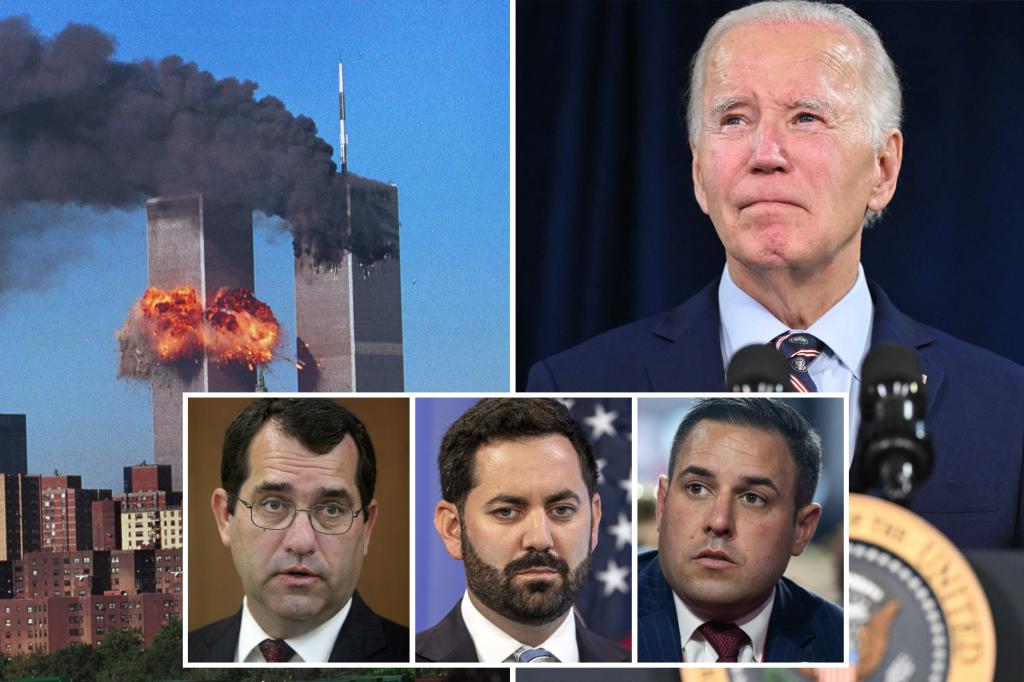The Biden administration’s handling of plea deals for three accused 9/11 plotters has ignited a firestorm of criticism from Republican lawmakers, who accuse the president of being “anti-victim” and “pro-criminal.” The controversy centers around pre-trial agreements offered to Khalid Sheikh Mohammed, the alleged mastermind of the attacks, and two co-conspirators, Walid Bin Attash and Mustafa al-Hawsawi. These deals would remove the death penalty from consideration in exchange for guilty pleas to war crimes, effectively guaranteeing life imprisonment instead of execution. This decision has been met with outrage by many family members of the nearly 3,000 victims of the 9/11 attacks, who believe the perpetrators deserve the ultimate punishment.
Republican representatives have not held back in their condemnation of the Biden administration’s actions. Rep. Mike Lawler (R-NY) called the plea deals an “abomination” and “unforgivable,” emphasizing the victims’ families’ right to see those responsible face the death penalty. Outgoing Rep. Anthony D’Esposito (R-NY), a former NYPD detective, went further, characterizing Biden as “fundamentally anti-victim & pro-criminal,” citing both the 9/11 plea deals and the president’s recent commutation of sentences for federal death row inmates. Rep.-elect Derek Schmidt (R-Kan.) offered a succinct and scathing assessment, labeling the Biden administration “the worst in American history.”
The timeline of events adds another layer of complexity to the situation. News of the plea deals first broke in July, prompting widespread condemnation and leading Defense Secretary Lloyd Austin to attempt to revoke them just three days later. However, a military judge subsequently ruled that Austin lacked the authority to rescind the agreements. This decision was ultimately upheld by a military appeals court, effectively siding with the defense attorneys who sought to enforce the plea bargains. The legal back-and-forth highlights the intricate legal landscape surrounding the prosecution of the 9/11 plotters and further fuels the political debate.
The plea deals raise fundamental questions about justice, accountability, and the appropriate punishment for those responsible for one of the most horrific terrorist attacks in American history. For the families of the victims, the prospect of the perpetrators escaping the death penalty is a betrayal. They argue that the magnitude of the crime demands the most severe punishment possible. Moreover, they see the plea deals as a disregard for the immense suffering caused by the attacks and a failure to deliver true justice.
From the perspective of the Biden administration and the military prosecutors who offered the plea deals, the rationale likely involves several factors. Securing convictions in the complex legal proceedings of military commissions can be challenging. Plea deals offer a degree of certainty, ensuring that the accused will spend the rest of their lives behind bars. They may also expedite the process, potentially avoiding lengthy and costly trials that could drag on for years. Additionally, the death penalty has become increasingly controversial, and some argue that life imprisonment is a more just and humane punishment.
This complex situation intertwines legal, political, and ethical considerations. The clashing perspectives of the victims’ families, the Republican lawmakers, and the Biden administration underscore the profound challenges involved in seeking justice for the 9/11 attacks. While some prioritize retribution and the death penalty, others emphasize the importance of securing convictions and avoiding protracted legal battles. The ongoing debate reflects the deep divisions within American society about how best to respond to acts of terrorism and the pursuit of justice in the face of unimaginable loss. The fate of the accused 9/11 plotters remains uncertain, with the legal and political battles likely to continue for the foreseeable future. This case serves as a stark reminder of the long shadow cast by 9/11 and the enduring struggle to find a path towards healing and accountability.

